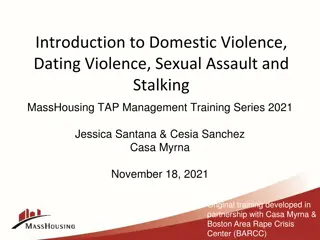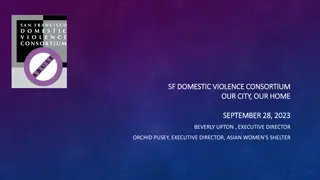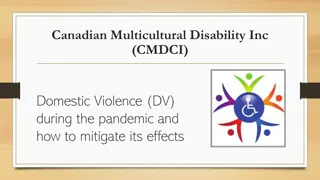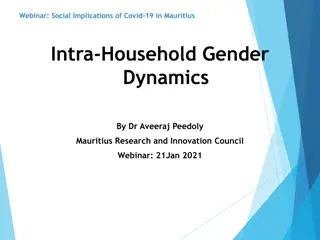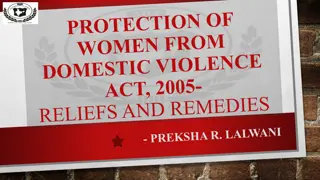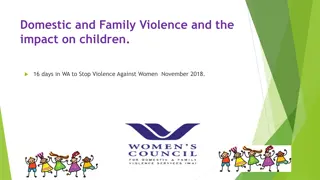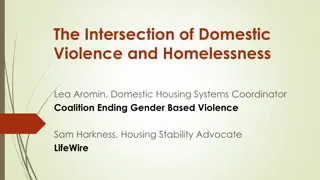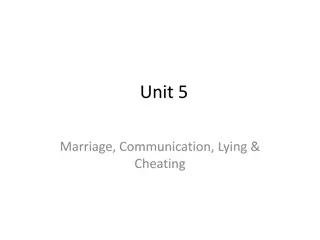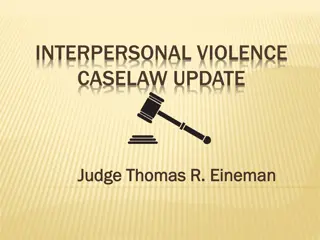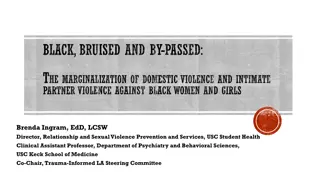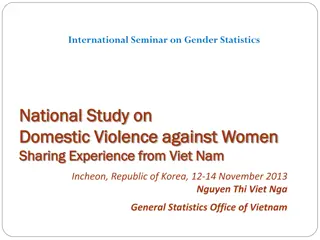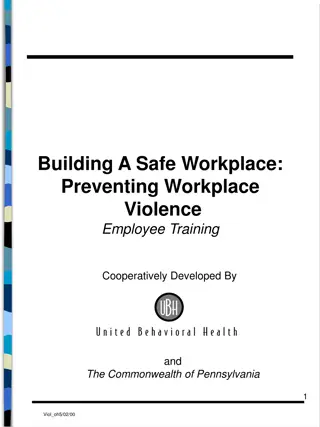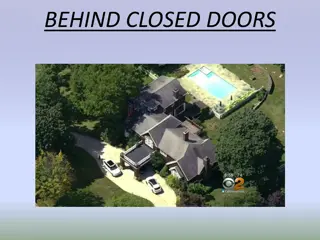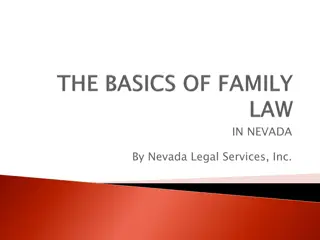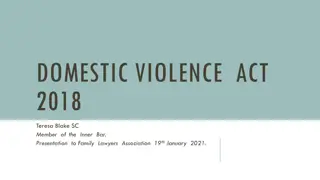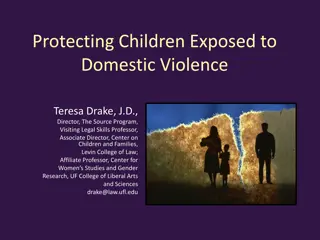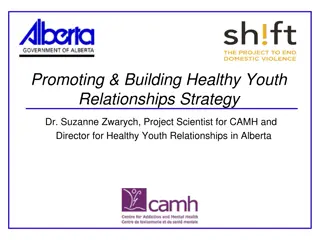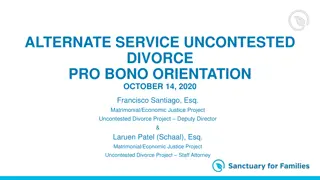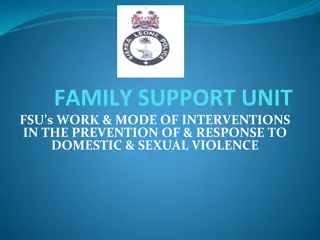Update on Domestic Violence Legislation in Nevada
Nevada faces a concerning trend of increasing domestic violence incidents, with over 30,000 offenses reported in 2017 alone. Assembly Bill 19 introduces new measures for service of process for protection orders, while Senate Bill 218 enhances penalties for repeat violators. These legislative updates aim to improve response mechanisms and protect victims of domestic violence in the state.
Download Presentation

Please find below an Image/Link to download the presentation.
The content on the website is provided AS IS for your information and personal use only. It may not be sold, licensed, or shared on other websites without obtaining consent from the author.If you encounter any issues during the download, it is possible that the publisher has removed the file from their server.
You are allowed to download the files provided on this website for personal or commercial use, subject to the condition that they are used lawfully. All files are the property of their respective owners.
The content on the website is provided AS IS for your information and personal use only. It may not be sold, licensed, or shared on other websites without obtaining consent from the author.
E N D
Presentation Transcript
Domestic Violence Legislative Update
Domestic Violence in Nevada Every 17 minutes and 20 seconds, an act of domestic violence is reported to law enforcement in this state. In Nevada, over 30,000 domestic violence offenses were reported in 2017, a rate that has increased every single year for at least the past five years. Nevada has one of the highest rates of domestic violence in the nation, and consistently leads the nation for domestic violence fatalities.
Assembly Bill 19 Creates an alternate mechanism for service of process for TPOs: Law enforcement must leave a notice at the adverse party s residence stating that the adverse party may respond within 24 hours. If unsuccessful personal service three times, the applicant for the temporary order may petition the court to order the law enforcement agency to serve the adverse party at place of employment. If still unsuccessful, can serve by alternative service method pursuant to Nevada Rules of Civil Procedure. The purpose of creating an alternative service of process is to capture those actively evading service.
Assembly Bill 19 TPOs and EPOs must include a notice to the adverse party that responding to a communication by the protected party may constitute a violation of the order. Allows the court to issue extended orders of protection for up to two years, if the court provides a finding of fact providing the basis for the imposition of an EPO for a period of greater than one year. Adverse party can still petition for modification/vacation of EPO at any time during 2 year period.
Assembly Bill 19 Requires the Central Repository to keep all TPOs and EPOs against stalking, aggravate stalking or harassment, and sexual assault. Central Repository is working with state technology services to build electronic system in place to maintain expired orders. By viewing expired TPOs and EPOs, law enforcement officers can better respond to calls for service with more information about the history of the parties involved. Prosecutors can also use to expired orders to show history of violence. Requires the court to transmit orders for protection in the manner prescribed by the Central Repository. This will also improve records transmission to Central Repository (no more faxing orders that must be retyped by DPS staff).
Senate Bill 218 In granting a TPO or EPO, a court can only consider whether the act of domestic violence or the threat thereof satisfies the requirements of NRS 33.018 without considering any other factor in its determination to grant the temporary or extended order. Enhances penalties for repeat violators of EPOs: First offense: Misdemeanor (no change) Second offense: Gross misdemeanor Third+ offense: D felony
Assembly Bill 410 Extends maximum time for TPOs from 30 days to 45 days.
Assembly Bill 41 Expands the use of the Confidential Address Program to utility and telecommunications providers, county recorders and county assessors. Program administered by DHHS, make sure your victims are aware of it.
Assembly Bill 60 Adult siblings, cousins, and roommates: Are notconsidered to be in a domestic violence relationship unless there is a custodial or guardianship relationship. Still fall under the discretionary arrest provision for simple battery when a law enforcement officer has probable cause to believe that the person committed a battery within the preceding 24 hours. Purpose of this change is to identify the special relationship of family and/or intimacy that makes the victim particularly vulnerable. Adult siblings and cousins, while related, most often do not have this kind of relationship. Revises the unlawful acts that constitute domestic violence to include coercion, burglary, home invasion, and pandering.
Assembly Bill 60 Domestic battery penalty enhancements: First offense: Time remains the same but requires intermittent terms must be served by a period of at least 12 hours, rather than the current minimum period of 4 hours. Second offense in 7 years: Minimum increased from 10 days to 20 days, may be served intermittently. Third offense in 7 years: Increased to a B felony, punishable by a term of incarceration of 1-6 years. Domestic battery that results in substantial bodily harm penalty enhancement: Now punishable as a B felony with a term of incarceration of 1-6 years. unless a greater penalty is provided pursuant to NRS 200.481. Substantial bodily harm means bodily injury which creates a substantial risk of death or which causes serious, permanent disfigurement or protracted loss or impairment of the function of any bodily member or organ or prolonged physical pain. (NRS 0.060)
Assembly Bill 60 Previous felony conviction enhancement: Old language: If offender previously convicted of a domestic violence battery that constitutes a felony, then subsequent domestic violence battery punished as category B felony, 2-15 years. New language: If offender previously convicted of domestic violence crime that constitutes a felony, then subsequent domestic violence battery punished as category B felony, 2-15 years. Language is inclusive of other domestic violence felony crimes, not just felony battery.
Assembly Bill 60 Domestic battery penalty enhancements for pregnant victim: Victim was pregnant at the time of the battery AND the offender knew or should have known that the victim was pregnant. First offense: Gross misdemeanor. Any subsequent offense: B felony, punishable by a term of incarceration of 1-6 years (no 7 year time limit). One of the leading causes of death for pregnant women is homicide. Pregnant women who are battered are more likely to experience violent trauma and are twice as likely to die after trauma as non-pregnant women. Pregnant women who experience domestic violence are likely to have been victimized prior to becoming pregnant, but the violence gets more severe (and fatal) once they become pregnant.
Assembly Bill 60 Updates to stalking statute: A person who, without lawful authority, willfully or maliciously engages in a course of conduct directed towards a victim that would cause a reasonable person under similar circumstances to feel terrorized, frightened, intimidated, harassed or fearful for his or her immediate safety or the immediate safety of a family or household member, and that actually causes the victim to feel terrorized, frightened, intimidated, harassed or fearful for his or her immediate safety or the immediate safety of a family or household member, commits the crime of stalking. Course of conduct means a pattern of conduct which consists of two or more acts (rather than a series) over a period of time that evidences a continuity of purpose directed at a specific person. Under similar circumstances clarifies that the reasonable person standard should be used under perspective of a reasonable person under the victim s circumstances. His or her immediate safety added because old statute unclear, appeared that a person only commits crime if they have made the victim s family fearful for their safety, rather than victim s own safety.
Assembly Bill 60 Stalking penalty enhancements: First offense: Misdemeanor (no change). Second offense: Gross misdemeanor. Third+ offense: C felony punishable by 1-5 years. If the victim is under the age of 16 AND offender is at least 5 years older than the victim: First offense: Gross misdemeanor. Second offense: C felony punishable by 2-5 years. Third offense: B felony punishable by 2-15 years. Used the offender age difference to ensure that younger offenders were not punished more harshly because of conduct committed against their peers, but to punish offenders who prey on children. No change to existing enhanced penalties for death threats (aggravated stalking, B felony) or using electronic means to distribute information that substantially increases risk of violence (doxing, C felony). Clarified jurisdiction: any act engaged in by offender was initiated here OR had an effect on the victim in Nevada, offender may be prosecuted in this State.
Assembly Bill 60 Requires everyone convicted of domestic violence crimes to attend domestic violence treatment, including those convicted by municipal court judges and justices of the peace. Requires everyone convicted of domestic violence crimes (not just battery) to pay $35 assessment for domestic violence programs. Adds prosecuting attorney as an officer of the State for enhanced assault and battery.




